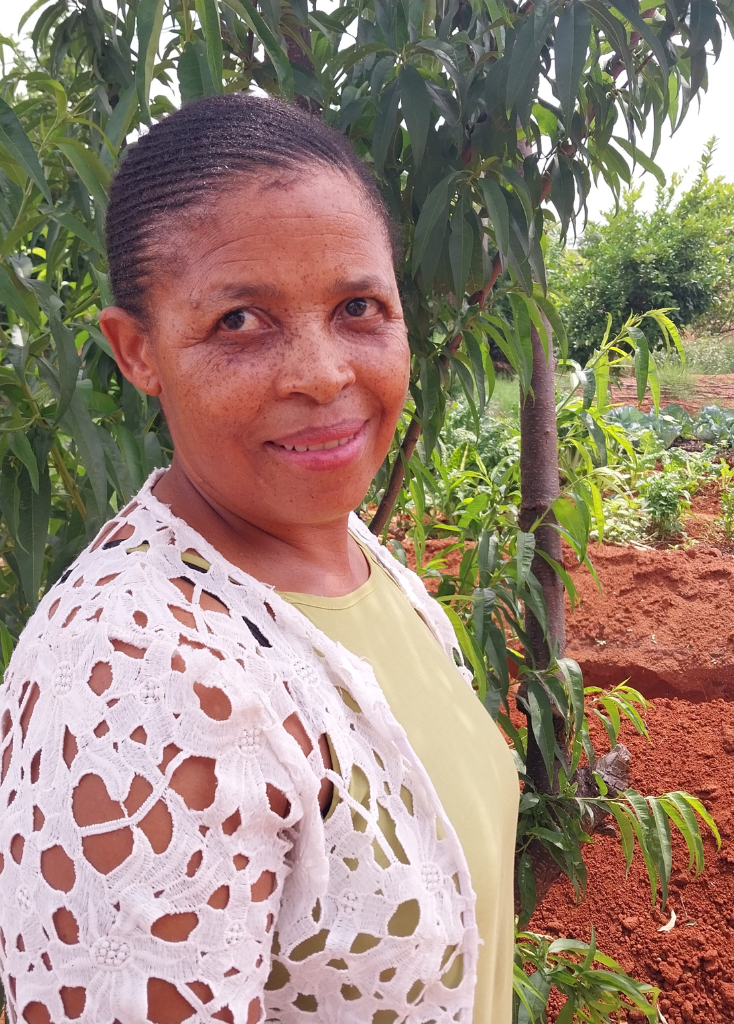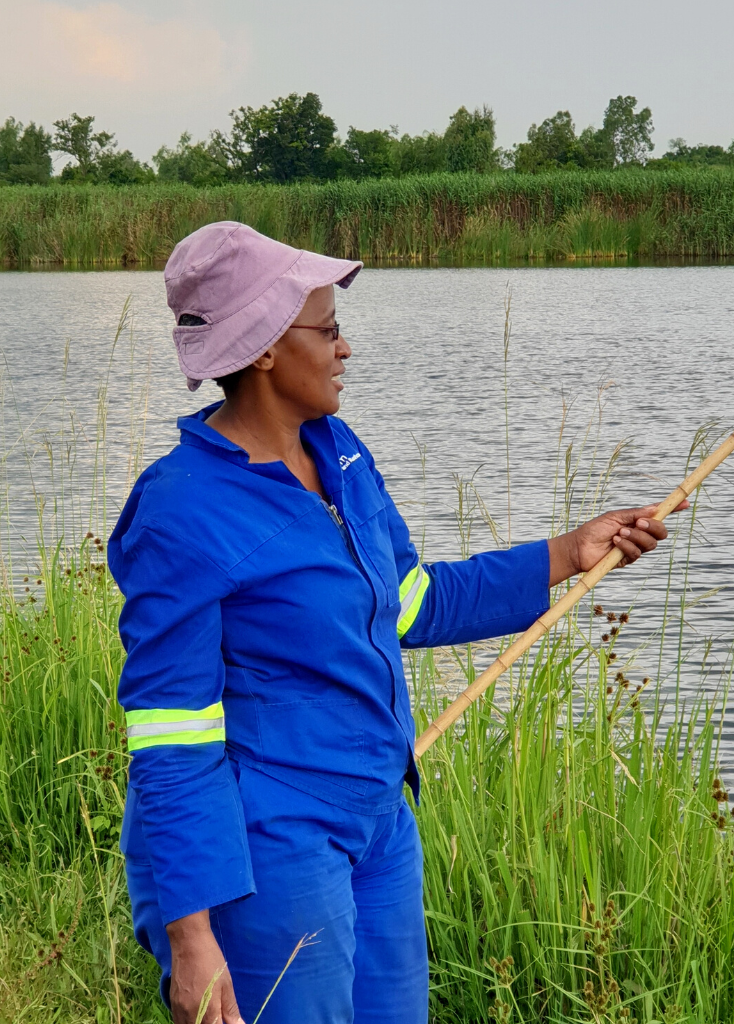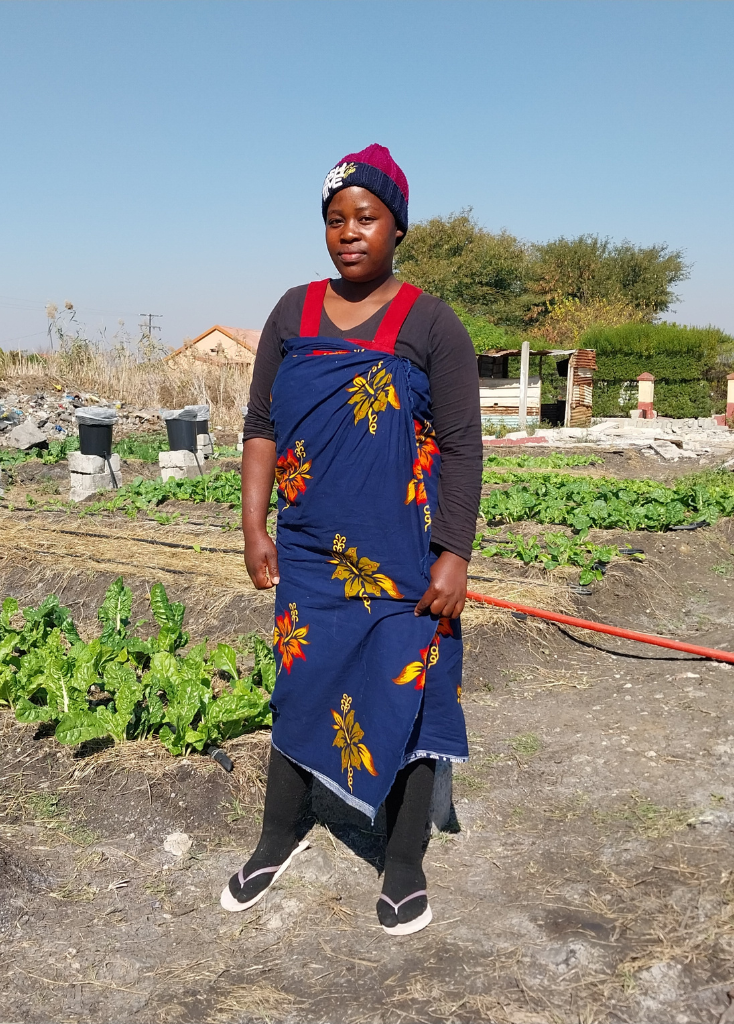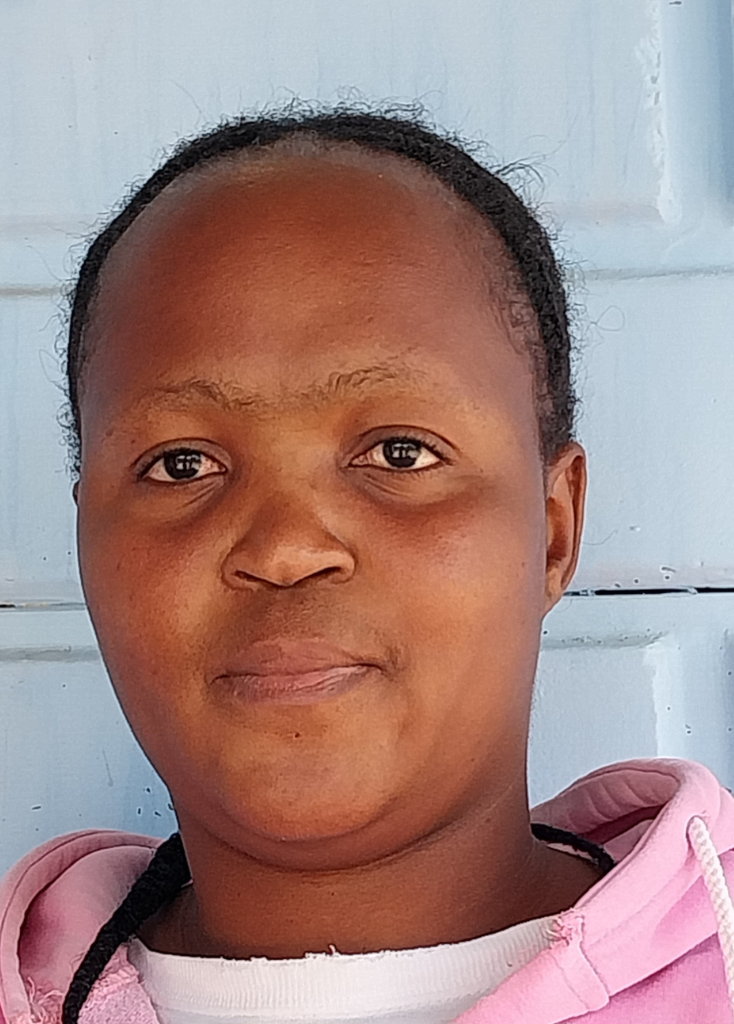
BBL PARTICIPANT: Paulinah Letlalo, Maubane Community, Northwest Province
In a Nutshell
Through her participation in SocioTech’s Broad-Based Livelihoods (BBL) strategies to stimulate personal economic activity, Paulina Letlalo from Maubane Community in Northwest Province has had record results even as a first-time vegetable grower. The SocioTech Business Tools has unlocked a world of understanding and predictable profitability.
She says…
In the early 1980s, when I was still small, maybe about 12 years old, there was a farmer who used to pay me and my friends 50 cents a day to weed his mielie fields. We worked on weekends and school holidays, starting at 6am and working through until 5pm. We had no time to play around. We would weed the field one side to the other and then stop for brown bread and jam breakfast. Then we would turn around and do it again on the next side of the field. When we made it to the other side, there would be pap and beans for lunch. And then we would go back up again until it was all done. That was in Chester (Settlers) in Limpopo province. Looking back now, that sounds like a lot of work for very little cash but that was our pocket money for the whole week – 10 cents, 10 cents, 10 cents – kotas with chips, juice, and other little treats.
I did agriculture at school, but it was all theory. Our school had no garden but somehow our teacher, Mr Madumo, still managed to inspire me with a love for the subject. When I finished my standard 10 there was no money to further my studies, so I took various piece jobs to support my younger siblings. The one I remember most clearly was at Martilon textured yarn factory – I earned R48.00 a week working as a machine operator.
I had my first daughter in 1990. After 6 months I left her in the care of my mum and started selling food (kotas, pap and vleis, mogodu) at the Putco bus station in Marabastad.
"I left her in the care of my mum and started selling food..."
"...because i didn't know how to manage money.."
If I think about it now – with the knowledge I have gained from my subsequent SocioTech MyBusiness training, I understand why I wasn’t very successful with that business because I didn’t know how to manage money. I didn’t know to keep records and then study the patterns in my business to see what was working or not working. If my food didn’t sell, I used to give it away to people on the bus on the way home. They would all wait for me at the end of the day saying, “Mama, do you have food for me?” I was happy to give. I have been hungry. I know what it is like to walk long distances on an empty stomach. I was glad to be able to help but that is not a sustainable way to run a business.
Later I went into the childcare business. I love being around children. Everyone who knows me knows that about me. I love talking to them. When I was younger, I was that child who had things to say and wasn’t listened to and I never want others to feel that way. I started a day care centre in my two-roomed RDP house. I ran that business between 2011 to 2014 but the problem was that people would send their children without money and I couldn’t turn them away. I was taking food from my own home to cook for them. It was draining me and my children. Again, this is not a sustainable business model.
I think in a different life, if there had been more money and time in my family perhaps, I would have trained to be a social worker or a teacher. For a while I had an internship at the Poverty Alleviation programme within the department of Social Development. That started as a one-year job that was extended to two years. I monitored and evaluated the early childhood development programmes at creches. That line of work suited my tender heart very well, but then it came to an end.
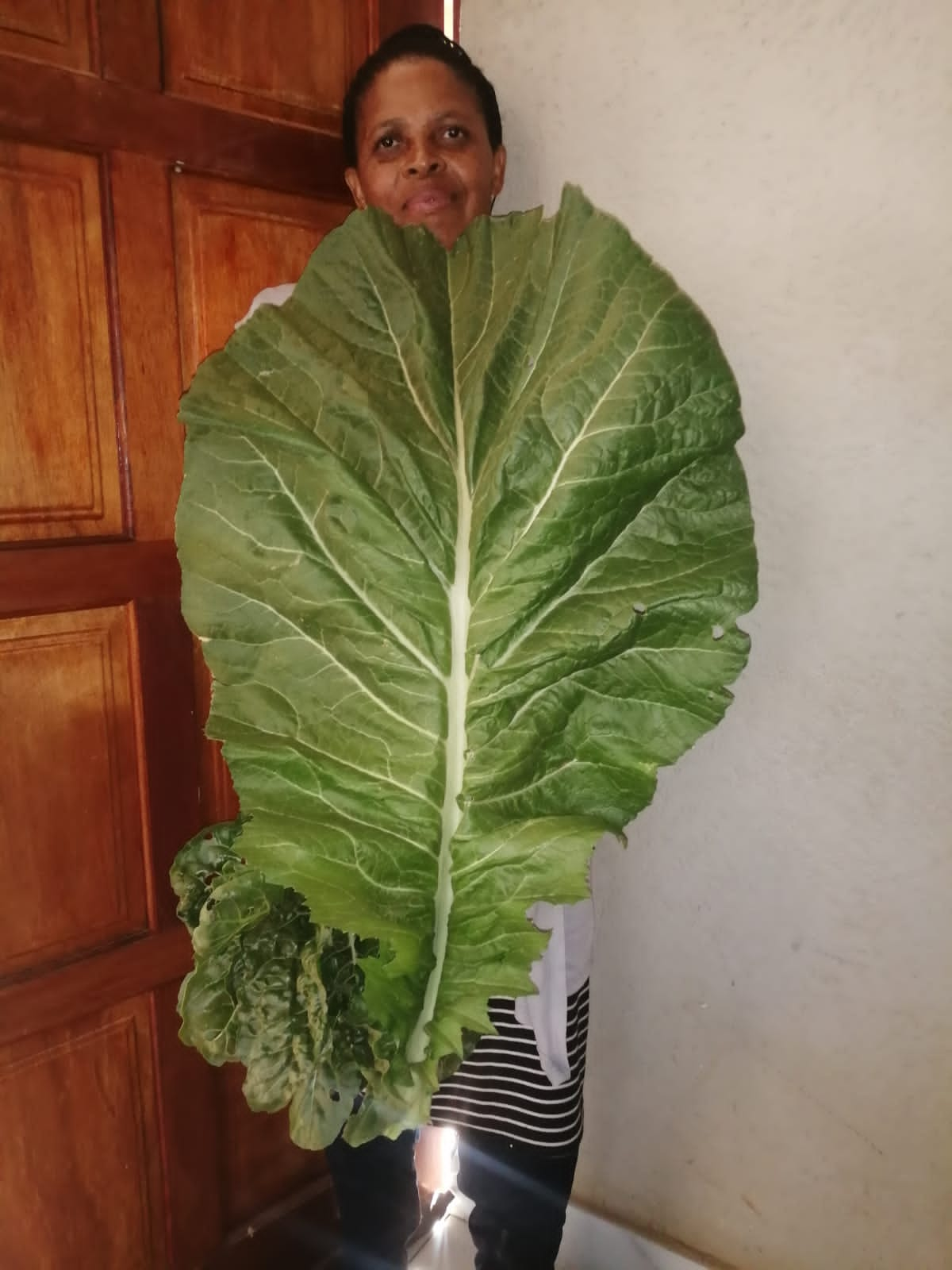
"It was like a tourist attraction! "
I met Mpho and Pastor David from Sukuma in 2018. The first thing that drew me to them was the way that they were sharing the Bible. I was much more sceptical about the garden stuff. I wasn’t a fan of all that collecting tins and digging holes. I was there for the sharing of the Word. So, the first time I encountered them I focused on the scripture, but then in early 2023 I met them again, and this time they came with SocioTech.
"I was ready to see the connections between the gardening and the scripture. "
This time something changed, and as I listened to the agricultural talk, I was ready to see the connections between the gardening and the scripture. They were talking about gardening God’s way. Without chemicals – if there are problems, there is no need for pesticides - we were shown how to make a spray with grated Sunlight, thepe (amaranth) and blackjacks. So, I decided to give it a go. I started with 3 trenches and 2 months later I had my first harvest.
I was so excited to see those plants come up. I felt such love and joy. My spinach was so big, so green, so beautiful. There was one particular mustard green (we call it China spinach) that grew so big, it was almost as tall as me! People came from all over the location to see it! It was like a tourist attraction! People were so amazed. They asked “how did you do this?” All I could say was that that big spinach was my heart in a plant form.
At first, I was growing just for home use. In these days of rising prices there is a big saving if you can grow your own vegetables. I followed the guidelines of SocioTech’s MyFood teaching, so my first beds were planted with The Food Robot colours (Red, Orange and Green). I am gradually taking the garden from home use into business because that first harvest gave me more than I could eat in my household. I started to give my neighbours and fellow worshipers at church some of my produce. They liked what they tasted and asked to buy. That side is increasing, so I think it is becoming a small business. I am starting to dig more trenches – you can see here are the beginnings of trenches 4 and 5. My plan is to gradually increase the space under cultivation. If you come back in a year, I hope you will find even more of this area under cultivation.
I am sticking with the vegetables but so far, I am not finding it very profitable – I was shocked when I checked the accounts using the MyBusiness methods. There were start-up costs that have taken a lot of what might otherwise have been profit. For instance, I decided to pay someone to help me dig the first 3 trenches.
Record-keeping is what allowed me to see that I wasn’t making money. That is one of the wonderful things about the SocioTech MyBusiness training. It sounds so simple, but unless you keep records you will not understand what is happening.
When I looked at my records, I could see that there was more money going out than coming in. I look back to the years selling food in Marabastad and all that food I gave away. If I had known then what I know now, I could have been so much further in my business journey.
This realisation pushed me to think outside of the box. I was very inspired by the food processing classes that we did with SocioTech. I was at my sister’s place, and she has 3 avocado trees. And there were piles of unused fruit just being thrown away. SocioTech taught me that nothing should be thrown away, so my sister and I looked on YouTube and we saw a video on avocado oil. The first time we tried it didn’t work, but we persisted and now we have mastered the technique. You mash the flesh and put it in the oven on a low heat until the liquid has all come out and then you put the brown mixture in a cloth and squeeze to extract the oil.
"Record-keeping is what allowed me to see that I wasn’t making money. "
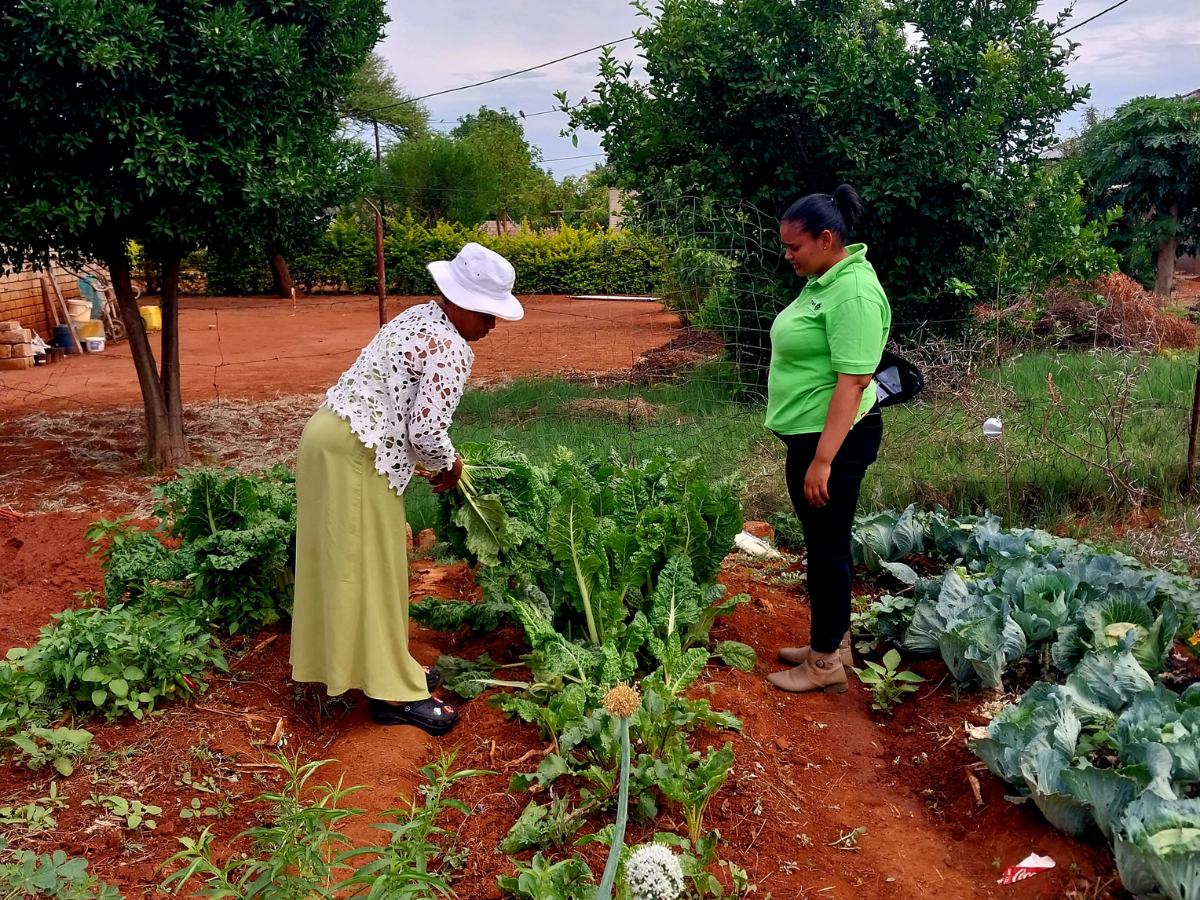
The avocado oil sells for R20 for 10ml, R110 for 50ml and R180 for 100ml. I put pictures of the bottles on my WhatsApp status to market the product and customers are coming. Some people cook with it – Chef Siya Kobo used it and said it was wonderful – but most customers put it into their skin lotions to nourish their skin. My niece has made beautiful labels. So far, the business has no name, but we must think of one. The avocado oil seems to be bringing in money. There are a few issues. The big one is that it is very time consuming – it takes a whole day to squeeze one litre. Also, not all avocados are the same – some are big and full of oil. Others are small and dry with a big pit and almost no flesh. There is also the issue about what we will do when avocados are out of season. We need to find a way of preserving them so we can press all year round. Finally, we know that currently the avocados are free but if the business grows, we will have to start buying extra. All these factors are important, but I truly believe that these issues can be resolved and that there is the start of a good business here.

I have been blessed. All three of my daughters are professionals but when a professional retires, they cannot give that profession to their children. Each of my daughters also has a side hustle – for instance my first born, Thabang, is a social worker but she also has a small business as a makeup artist. I have shown them all the SocioTech record keeping system and they all use it in their side hustles.
Even my daughter Lebogang (who is a finance intern) uses it. All these years she used to try and explain money management to me. Even when she was in matric, she would show me her textbooks but the way that they are taught is so focused on big businesses that it is really hard to understand for those of us at the small business end of the economic spectrum. I couldn’t see how her theory was relevant to my daily business issues. It was too complicated and too overwhelming.
The SocioTech methods set out the same concepts but in a way that an ordinary person can understand.
As you can see from my story, I am a person who wants to help those who need help but using the SocioTech record keeping method has shown me the impact that this behaviour was having on me and my family.
When you record everything, and you see that there is a shortfall – and you can see that the shortfall comes from all the giving – you understand what is happening. I am committed to always helping those in need. That is God’s way, but I have learnt that there are methods of giving that benefit others and do not damage me.
I am learning not to fish for others but rather that I can show others how to catch their own fish. For instance, teaching those in need how to make trenches and plant their own vegetables.



